- Home
- Robert E. Howard
Historical Adventures
Historical Adventures Read online
HISTORICAL ADVENTURES
Robert E. Howard
ENDYMION PRESS
Thank you for reading. If you enjoy this book, please leave a review or connect with the author.
All rights reserved. Aside from brief quotations for media coverage and reviews, no part of this book may be reproduced or distributed in any form without the author’s permission. Thank you for supporting authors and a diverse, creative culture by purchasing this book and complying with copyright laws.
Copyright © 2016 by Robert E. Howard
Interior design by Pronoun
Distribution by Pronoun
TABLE OF CONTENTS
RED BLADES OF BLACK CATHAY
LORD OF SAMARCAND
THE SOWERS OF THE THUNDER
THE LION OF TIBERIAS
THE SHADOW OF THE VULTURE
GATES OF EMPIRE
RED BLADES OF BLACK CATHAY
CHAPTER 1
Trumpets die in the loud parade,
The gray mist drinks the spears;
Banners of glory sink and fade
In the dust of a thousand years.
Singers of pride the silence stills,
The ghost of empire goes,
But a song still lives in the ancient hills,
And the scent of a vanished rose.
Ride with us on a dim, lost road
To the dawn of a distant day,
When swords were bare for a guerdon rare.
—The Flower of Black Cathay.
THE SINGING of the swords was a deathly clamor in the brain of Godric de Villehard. Blood and sweat veiled his eyes and in the instant of blindness he felt a keen point pierce a joint of his hauberk and sting deep into his ribs. Smiting blindly, he felt the jarring impact that meant his sword had gone home, and snatching an instant’s grace, he flung back his vizor and wiped the redness from his eyes. A single glance only was allowed him: in that glance he had a fleeting glimpse of huge, wild black mountains; of a clump of mail-clad warriors, ringed by a howling horde of human wolves; and in the center of that clump, a slim, silk-clad shape standing between a dying horse and a dying swordsman. Then the wolfish figures surged in on all sides, hacking like madmen.
“Christ and the Cross!” the old Crusading shout rose in a ghastly croak from Godric’s parched lips. As if far away he heard voices gaspingly repeat the words. Curved sabers rained on shield and helmet. Godric’s eyes blurred to the sweep of frenzied dark faces with bristling, foam-flecked beards. He fought like a man in a dream. A great weariness fettered his limbs. Somewhere—long ago it seemed—a heavy axe, shattering on his helm, had bitten through an old dent to rend the scalp beneath. He heaved his curiously weighted arm above his head and split a bearded face to the chin.
“En avant, Montferrat!” We must hack through and shatter the gates, thought the dazed brain of Godric; we can not long stand this press, but once within the city—no—these walls were not the walls of Constantinople: he was mad; he dreamed—these towering heights were the crags of a lost and nameless land and Montferrat and the Crusade lay lost in leagues and years.
Godric’s steed reared and pitched headlong, throwing his rider with a clash of armor. Under the lashing hoofs and the shower of blades, the knight struggled clear and rose, without his shield, blood starting from every joint in his armor. He reeled, bracing himself; he fought not these foes alone, but the long grinding days behind—the days and days of hard riding and ceaseless fighting.
Godric thrust upward and a man died. A scimitar shivered on his crest, and the wielder, torn from his saddle by a hand that was still iron, spilled his entrails at Godric’s feet. The rest reined in around howling, seeking to overthrow the giant Frank by sheer weight of numbers. Somewhere in the hellish din a woman’s scream knifed the air. A clatter of hoofs burst like a sudden whirlwind and the press was cleared. Through a red mist the dulling eyes of the knight saw the wolfish, skinclad assailants swept away by a sudden flood of mailed riders who hacked them down and trampled them under.
Then men were dismounting around him, men whose gaudy silvered armor, high fur kaftans and two-handed scimitars he saw as in a dream. One with thin drooping mustaches adorning his dark face spoke to him in a Turkish tongue the knight could faintly understand, but the burden of the words was unintelligible. He shook his head.
“I can not linger,” Godric said, speaking slowly and with growing difficulty, “De Montferrat awaits my report and I must—ride—East—to—find—the— kingdom—of—Prester—John - - bid—my—men—mount—”
His voice trailed off. He saw his men; they lay about in a silent, sword- gashed cluster, dead as they had lived—facing the foe. Suddenly the strength flowed from Godric de Villehard in a great surge and he fell as a blasted tree falls. The red mist closed about him, but ere it engulfed him utterly, he saw bending near him two great dark eyes, strangely soft and luminous, that filled him with formless yearning; in a world grown dim and unreal they were the one tangible reality and this vision he took with him into a nightmare realm of shadows.
Godric’s return to waking life was as abrupt as his departure. He opened his eyes to a scene of exotic splendor. He was lying on a silken couch near a wide window whose sill and bars were of chased gold. Silken cushions littered the marble floor and the walls were of mosaics where they were not worked in designs of gems and silver, and were hung with heavy tapestries of silk, satin and cloth-of-gold. The ceiling was a single lofty dome of lapis lazuli from which was suspended on golden chains a censer that shed a faint alluring scent over all. Through the window a faint breeze wafted scents of spices, roses and jasmine, and beyond Godric could see the clear blue of the Asian skies.
He tried to rise and fell back with a startled exclamation. Whence this strange weakness? The hand he lifted to his gaze was thinner than should be, and its bronze was faded. He gazed in perplexity at the silken, almost feminine garments which clothed him, and then he remembered—the long wandering, the battle, the slaughter of his men-at-arms. His heart turned sick within him as he remembered the staunch faithfulness of the men he had led to the shambles.
A tall, thin yellow man with a kindly face entered and smiled to see that he was awake and in his right mind. He spoke to the knight in several languages unknown to Godric, then used one easy to understand—a rough Turkish dialect much akin to the bastard tongue used by the Franks in their contacts with the Turanian peoples.
“What place is this?” asked Godric. “How long have I lain here?”
“You have lain here many days,” answered the other. “I am You-tai, the emperor’s man-of-healing. This is the heavenborn empire of Black Cathay. The princess Yulita has attended you with her own hands while you lay raving in delirium. Only through her care and your own marvelous natural strength have you survived. When she told the emperor how you with your small band recklessly charged and delivered her from the hands of the Hian bandits who had slain her guard and taken her prisoner, the heavenly one gave command that naught be spared to preserve you. Who are you, most noble lord? While you raved you spoke of many unknown peoples, places and battles and your appearance is such as to show that you come from afar.”
Godric laughed, and bitterness was in his laughter.
“Aye,” quoth he, “I have ridden far; the deserts have parched my lips and the mountains have wearied my feet. I have seen Trebizond in my wanderings, and Teheran and Bokhara and Samarcand. I have looked on the waters of the Black Sea and the Sea of Ravens. From Constantinople far to the west I set forth more than a year agone, riding eastward. I am a knight of Normandy, Sir Godric de Villehard.”
“I have heard of some of the places you name,” answered You-tai, “but many of them are unknown to me. Eat now, a
nd rest. In time the princess Yulita will come to you.”
So Godric ate the curiously spiced rice, the dates and candied meats, and drank the colorless rice wine brought him by a flat-faced girl slave who wore golden bangles on her ankles, and soon slept, and sleeping, his unquenchable vitality began to assert itself.
When he awoke from that long sleep he felt refreshed and stronger, and soon the pearl-inlaid doors opened and a slight, silk-clad figure entered. Godric’s heart suddenly pounded as he again felt the soft, tender gaze of those great dark eyes upon him. He drew himself together with an effort; was he a boy to tremble before a pair of eyes, even though they adorned the face of a princess?
Long used was he to the veiled women of the Moslems, and Yulita’s creamy cheeks with her full ruby lips were like an oasis in the waste.
“I am Yulita,” the voice was soft, vibrant and musical as the silvery tinkle of the fountain in the court outside. “I wish to thank you. You are brave as Rustum. When the Hians rushed from the defiles and cut down my guard, I was afraid. You answered my screams as unexpectedly and boldly as a hero sent down from paradise. I am sorry your brave men died.”
“And I likewise,” the Norman answered with the bluntness of his race, “but it was their trade: they would not have had it otherwise and they could not have died in a better cause.”
“But why did you risk your life to aid me, who am not of your race and whom you never saw before?” she pursued.
Godric might have answered as would nine out of any ten knights in his position—with the repeating of the vow of chivalry, to protect all weaker things. But being Godric de Villehard, he shrugged his shoulders. “God knows. I should have known it was death to us all to charge that horde. I have seen too much rapine and outrage since I turned my face east to have thus thrown away my men and expedition in the ordinary course of events. Perhaps I saw at a glance you were of regal blood and followed the knight’s natural instinct to rush to the aid of royalty.”
She bowed her head. “I am sorry.”
“I am not,” he growled. “My men would have died anyhow today or tomorrow — now they are at rest. We have ridden through hell for more than a year. Now they are beyond the sun’s heat and the Turk’s saber.”
She rested her chin on her hands and her elbows on her knees, leaning forward to gaze deep into his eyes. His senses swam momentarily. Her eyes traversed his mighty frame to return to his face. Thin-lipped, with cold gray eyes, Godric de Villehard’s sun-darkened, clean-shaven face inspired trust and respect in men but there was little in his appearance to stir the heart of a woman. The Norman was not past thirty, but his hard life had carved his face into inflexible lines. Rather than the beauty that appeals to women, there was in his features the lean strength of the hunting wolf. The forehead was high and broad, the brow of a thinker, and once the mouth had been kindly, the eyes those of a dreamer. But now his eyes were bitter and his whole appearance that of a man with whom life has dealt hardly— who has ceased to look for mercy or to give it.
“Tell me, Sir Godric,” said Yulita, “whence come you and why have you ridden so far with so few men?”
“It’s a long tale,” he answered. “It had its birth in a land halfway across the world. I was a boy and full of high ideals of chivalry and knighthood—and I hated that Saxon-French pig, King John. A wine-bibber named Fulk of Neuilly began ranting and screaming death and damnation because the Holy Land was still in the possession of the Paynim. He howled until he stirred the blood of such young fools as myself, and the barons began recruiting men—forgetting how the other Crusades had ended.
“Walter de Brienne and that black-faced cut-throat Simon de Montfort fired us young Normans with promises of salvation and Turkish loot, and we set forth. Boniface and Baldwin were our leaders and they plotted against each other all the way to Venice.
“There the mercenary Venetians refused us ships and it sickened my very entrails to see our chiefs go down on their knees to those merchant swine. They promised us ships at last but they set such a high price we could not pay. None of us had any money, else we had never started on that mad venture. We wrenched the jewels from our hilts and the gold from our buckles and raised part of the money, bargaining to take various cities from the Greeks and give them over to Venice for the rest of the price. The Pope—Innocent III—raged, but we went our ways and quenched our swords in Christian blood instead of Paynim.
“Spalato we took, and Ragusa, Sebenico and Zara. The Venetians got the cities and we got the glory.” Here Godric laughed harshly. A quick glance told him the girl was sitting spellbound, eyes aglow. Somehow he felt ashamed.
“Well,” he continued, “young Alexius who had been driven from Constantinople persuaded us that it would be doing God’s work to put old Angelus back on the throne, so we fared forth.
“We took Constantinople with no great difficulty, but only a scant time had elapsed before the maddened people strangled old Angelus and we were forced to take the city again. This time we sacked it and split the empire up. De Montfort had long returned to England and I fought under Boniface of Montferrat, who was made King of Macedonia. One day he called me to him, and said he: ‘Godric, the Turkomans harry the caravans and the trade of the East dries up because of constant war. Take a hundred men-at-arms and find me this kingdom of Prester John. He too is a Christian and we may establish a route of trade between us, guarded by both of us, and thus safeguard the caravans.’
“Thus he spoke, being a natural-born liar and unable to tell the truth on a wager. I saw through his design and understood his wish for me to conquer this fabulous kingdom for him.
“‘Only a hundred men?’ quoth I.
“‘I can not spare you more,’ said he, ‘lest Baldwin and Dandolo and the Count of Blois come in and cut my throat. These are enow. Gain ye to Prester John and abide with him awhile—aid him in his wars for a space, then send riders to report your progress to me. Mayhap then I can send you more men.’ And his eyelids drooped in a way I knew.
“‘But where lies this kingdom?’ said I.
“‘Easy enough,’ said he; ‘to the east—any fool can find it if he fares far enough.’
“So,” Godric’s face darkened, “I rode east with a hundred heavily armed horsemen—the pick of the Norman warriors. By Satan, we hacked our way through! Once past Trebizond we had to fight almost every mile. We were assailed by Turks, Persians and Kirghiz, as well as by our natural foes of heat, thirst and hunger. A hundred men—there were less than a score with me when I heard your screams and rode out of the defiles. Their bodies lie scattered from the hills of Black Cathay to the shores of the Black Sea. Arrows, spears, swords, all took their toll, but still I forged eastward.”
“And all for your liege lord!” cried Yulita, her eyes sparkling, as she clasped her hands. “Oh, it is like the tales of honor and chivalry; of Iran and those You-tai has told me of the heroes of ancient Cathay. It makes my blood burn! You too are a hero such as all men were once in the days of our ancestors, with your courage and loyalty!”
The sting of his healing wounds bit into Godric.
“Loyalty?” he snarled. “To that devious-minded assassin, Montferrat? Bah! Do you think I intended giving up my life to carve out a kingdom for him? He had naught to lose and all to gain. He gave me a handful of men, expecting to receive the rewards of what I did. If I failed, he was still winner, for he would be rid of a turbulent vassal. The kingdom of Prester John is a dream and a fantasy. I have followed a will-o’-the-wisp for a thousand miles. A dream that receded farther and farther into the mazes of the East, leading me to my doom.”
“And had you found it, what then?” asked the girl, grown suddenly quiet.
Godric shrugged his shoulders. It was not the Norman way to flaunt secret ambitions to any chance-met man or woman, but after all, he owed his life to this girl. She had paid her debt to him and there was something in her eyes....
“Had I found Prester John’s kingdom,” said Godric, “I had
made shift to conquer it for myself.”
“Look,” Yulita took Godric’s arm and pointed out a gold-barred window, whose sheer silken curtains, blowing inward, disclosed the rugged peaks of distant mountains, shouldering against the blazing blue of the skies.
“Beyond those mountains lies the kingdom of him you call Prester John.”
Godric’s eyes gleamed suddenly with the conquering spirit of the true Norman - - the born empire-maker, whose race had carved out kingdoms with their swords in every land of the West and Near East.
“And does he dwell in purple-domed palaces of gold and glittering gems?” he asked eagerly. “Do, as I have heard, learned philosophers and magi sit at either hand, doing wonders with stars and suns and ghosts of the mighty dead? Does his city loom among the clouds with golden spires thrusting among the stars? And does the deathless monarch, who learned at the feet of our fair Lord Christ, sit on an ivory throne in a room whose walls are carved of one great sapphire dispensing justice?”
She shook her head.
“Prester John—Wang Khan we name him—is very old, but he is not deathless nor has he ever been beyond the confines of his own kingdom. His people are the Keraits—Krits— Christians; they dwell in cities, true, but the houses are mud huts and goatskin tents, and the palace of Wang Khan is as a hut itself compared to this palace.”
Godric fell back and his eyes went dull.
“My dream is vanished,” he muttered. “You should have let me die.”
“Dream again, man,” she answered; “only dream something more attainable.”
Shaking his head, he looked into her eyes.
“Dreams of empire have haunted my life,” said he, “yet even now the shadow of a dream lingers in my soul, ten times less attainable than the kingdom of Prester John.”
* * *
CHAPTER 2
“Scrawled screens and secret gardens
And insect-laden skies—
Where fiery plains stretch on and on

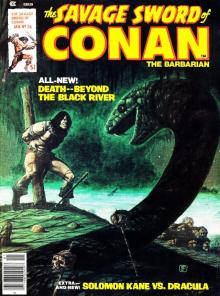 Beyond the Black River
Beyond the Black River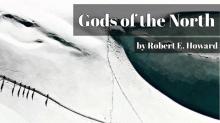 Gods of the North
Gods of the North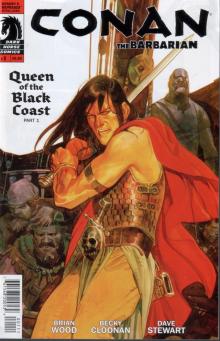 Queen of the Black Coast
Queen of the Black Coast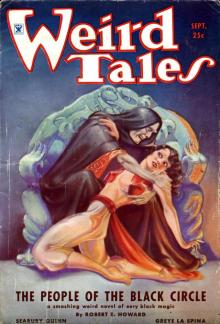 The People of the Black Circle
The People of the Black Circle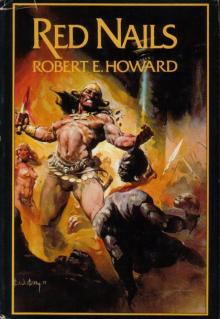 Red Nails
Red Nails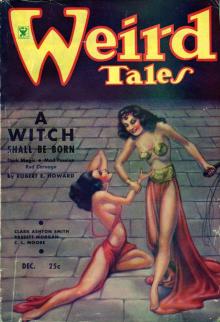 A Witch Shall Be Born
A Witch Shall Be Born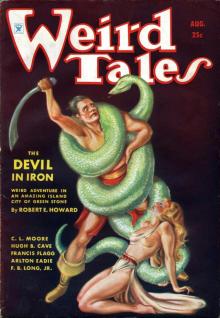 The Devil in Iron
The Devil in Iron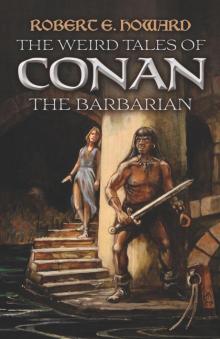 The Weird Tales of Conan the Barbarian
The Weird Tales of Conan the Barbarian The Bloody Crown of Conan
The Bloody Crown of Conan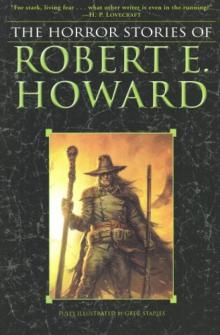 The Horror Stories of Robert E. Howard
The Horror Stories of Robert E. Howard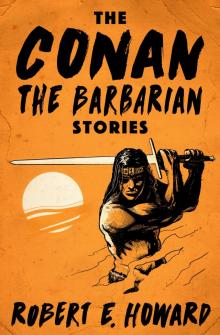 Conan the Conqueror
Conan the Conqueror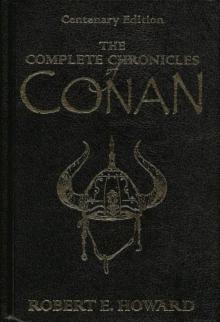 Conan the Barbarian
Conan the Barbarian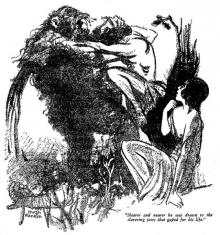 Shadows in the Moonlight
Shadows in the Moonlight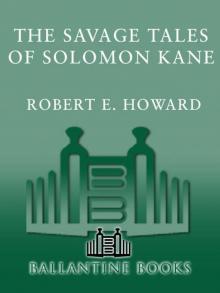 The Savage Tales of Solomon Kane
The Savage Tales of Solomon Kane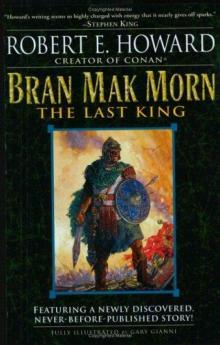 Bran Mak Morn: The Last King
Bran Mak Morn: The Last King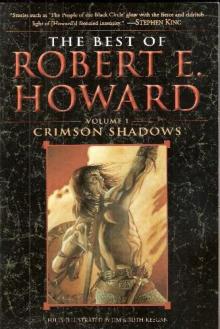 The Best of Robert E. Howard Volume One: Crimson Shadows
The Best of Robert E. Howard Volume One: Crimson Shadows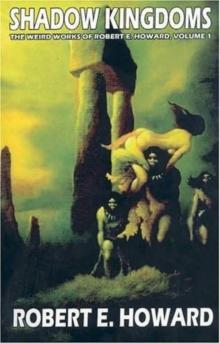 The Best of Robert E. Howard: Crimson Shadows (Volume 1)
The Best of Robert E. Howard: Crimson Shadows (Volume 1)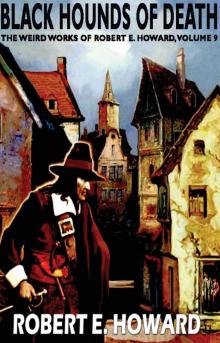 Black Hounds of Death
Black Hounds of Death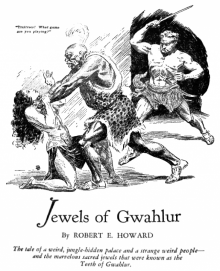 Jewels of Gwahlur
Jewels of Gwahlur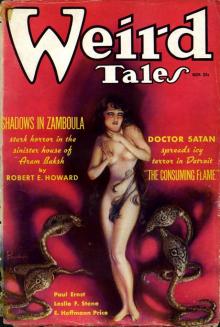 Shadows in Zamboula
Shadows in Zamboula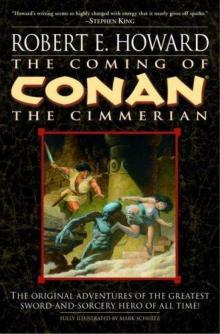 The Coming of Conan the Cimmerian
The Coming of Conan the Cimmerian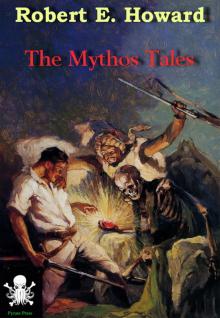 The Mythos Tales
The Mythos Tales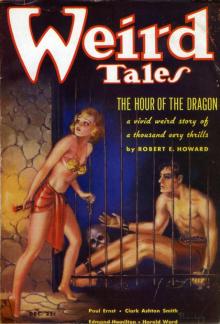 The Hour of the Dragon
The Hour of the Dragon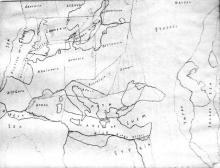 The Hyborian Age
The Hyborian Age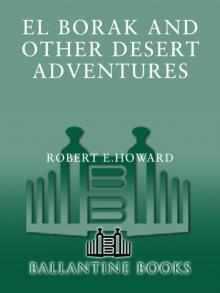 El Borak and Other Desert Adventures
El Borak and Other Desert Adventures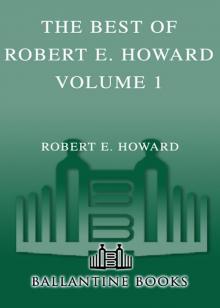 The Best of Robert E. Howard Volume 1 The Best of Robert E. Howard Volume 1
The Best of Robert E. Howard Volume 1 The Best of Robert E. Howard Volume 1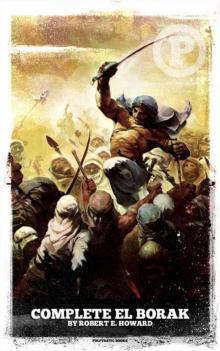 El Borak: The Complete Tales
El Borak: The Complete Tales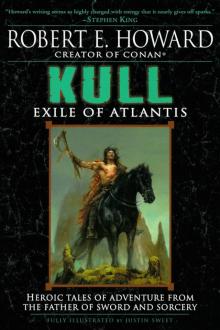 Kull: Exile of Atlantis
Kull: Exile of Atlantis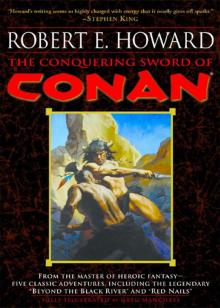 The Conquering Sword of Conan
The Conquering Sword of Conan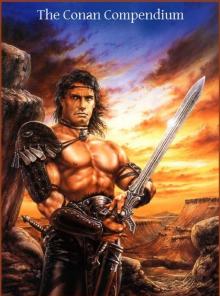 The Conan Compendium
The Conan Compendium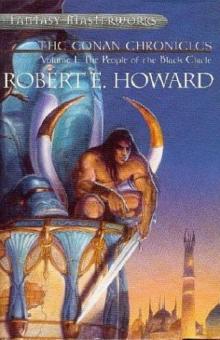 The Conan Chronicles: Volume 1: The People of the Black Circle
The Conan Chronicles: Volume 1: The People of the Black Circle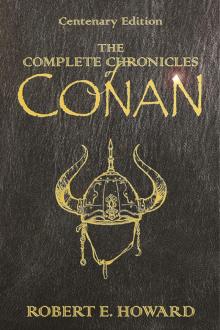 The Complete Chronicles of Conan: Centenary Edition
The Complete Chronicles of Conan: Centenary Edition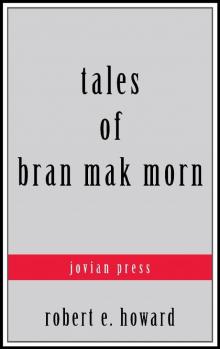 Tales of Bran Mak Morn (Serapis Classics)
Tales of Bran Mak Morn (Serapis Classics)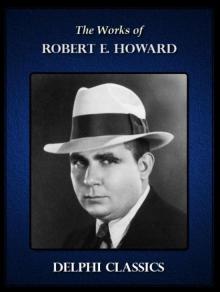 Delphi Works of Robert E. Howard (Illustrated) (Series Four)
Delphi Works of Robert E. Howard (Illustrated) (Series Four)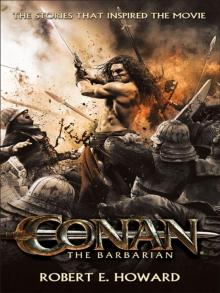 Conan the Barbarian: The Stories That Inspired the Movie
Conan the Barbarian: The Stories That Inspired the Movie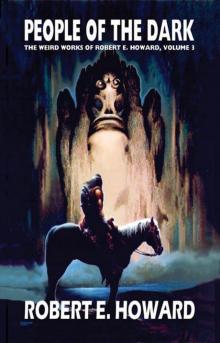 People of the Dark Robert Ervin Howard
People of the Dark Robert Ervin Howard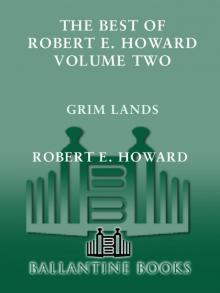 Grim Lands
Grim Lands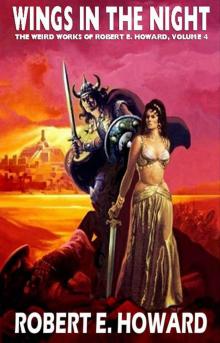 Wings in the Night
Wings in the Night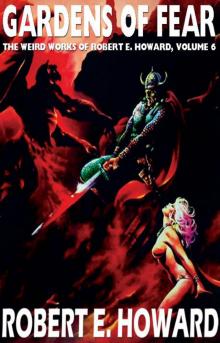 Gardens of Fear
Gardens of Fear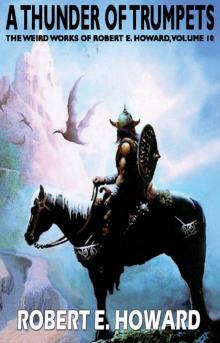 A Thunder of Trumpets
A Thunder of Trumpets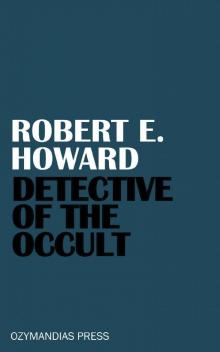 Detective of the Occult
Detective of the Occult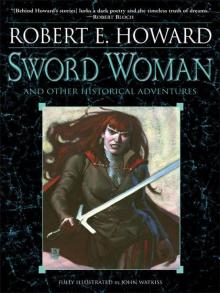 Sword Woman and Other Historical Adventures
Sword Woman and Other Historical Adventures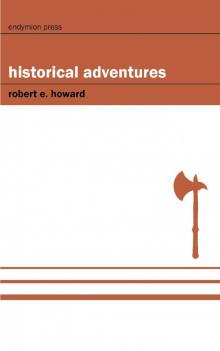 Historical Adventures
Historical Adventures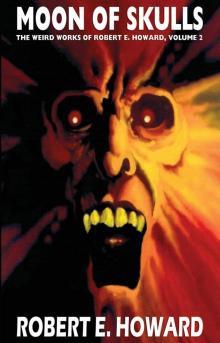 Moon of Skulls
Moon of Skulls The Robert E. Howard Omnibus: 97 Collected Stories
The Robert E. Howard Omnibus: 97 Collected Stories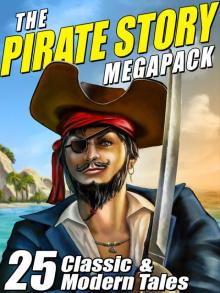 The Pirate Story Megapack: 25 Classic and Modern Tales
The Pirate Story Megapack: 25 Classic and Modern Tales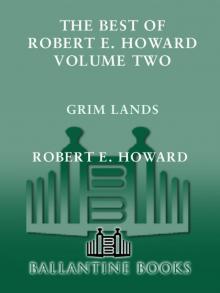 The Best of Robert E. Howard, Volume 2
The Best of Robert E. Howard, Volume 2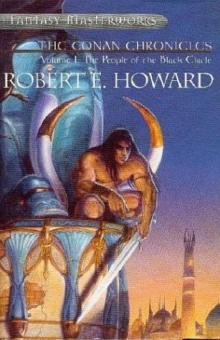 The Conan Chronicles, Vol. 1: The People of the Black Circle
The Conan Chronicles, Vol. 1: The People of the Black Circle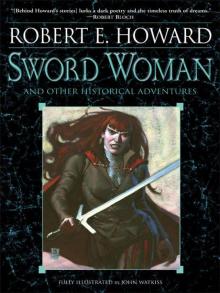 Sword Woman and Other Historical Adventures M
Sword Woman and Other Historical Adventures M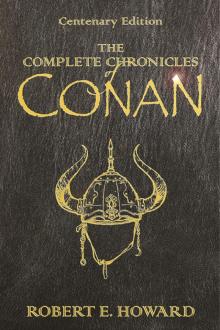 The Complete Chronicles of Conan
The Complete Chronicles of Conan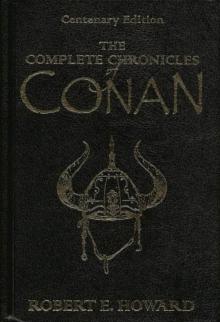 Conan the Barbarian: The Chronicles of Conan (collected short stories)
Conan the Barbarian: The Chronicles of Conan (collected short stories)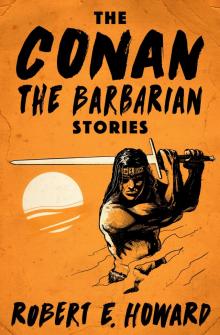 The Conan the Barbarian Stories
The Conan the Barbarian Stories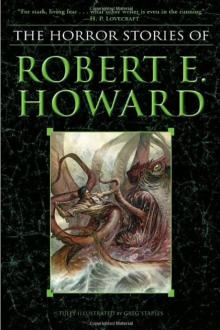 The Best Horror Stories of
The Best Horror Stories of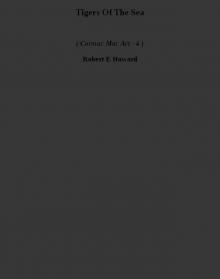 Tigers Of The Sea cma-4
Tigers Of The Sea cma-4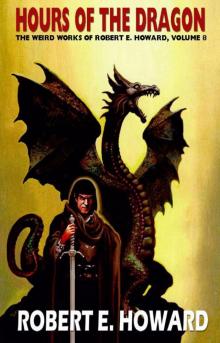 The Hours of the Dragon
The Hours of the Dragon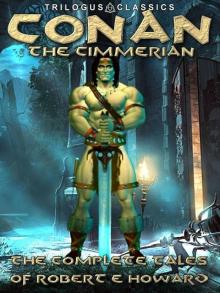 Conan the Cimmerian: The Complete Tales (Trilogus Classics)
Conan the Cimmerian: The Complete Tales (Trilogus Classics)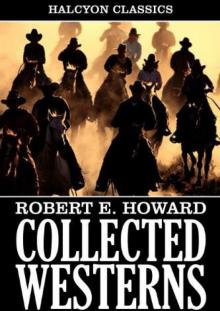 Collected Western Stories of Robert E. Howard (Unexpurgated Edition) (Halcyon Classics)
Collected Western Stories of Robert E. Howard (Unexpurgated Edition) (Halcyon Classics)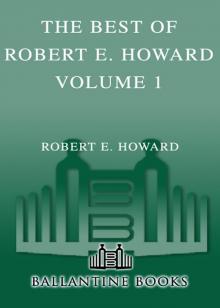 The Best of Robert E. Howard, Volume 1
The Best of Robert E. Howard, Volume 1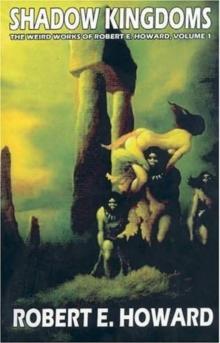 Shadow Kingdoms
Shadow Kingdoms